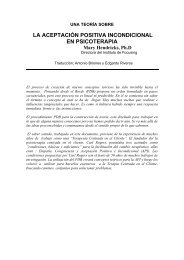8 Focusing en de experiëntiële aspecten van psychotherapie
8 Focusing en de experiëntiële aspecten van psychotherapie
8 Focusing en de experiëntiële aspecten van psychotherapie
Create successful ePaper yourself
Turn your PDF publications into a flip-book with our unique Google optimized e-Paper software.
600 Literatuur<br />
Elliott, R., Filipovich, H., Harrigan, L., Gaynor, J., Reimschuessel, C., & Zapadka, J.K. (1982). Measuring<br />
response empathy: The <strong>de</strong>velopm<strong>en</strong>t of a multi-compon<strong>en</strong>t rating scale. Journal of Counseling<br />
Psychology, 29, 379-387.<br />
Elliott, R., Fischer, C. T., & R<strong>en</strong>nie, D.L. (1999). Evolving gui<strong>de</strong>lines for publication of qualitative research<br />
studies in psychology and related fields. British Journal of Clinical Psychology, 38, 215-229.<br />
Elliott, R. & Freire, E. (July, 2008). Empirical support for person-c<strong>en</strong>tred/experi<strong>en</strong>tial <strong>psychotherapie</strong>s:<br />
Meta-analysis update. Paper pres<strong>en</strong>ted at Person-c<strong>en</strong>tred/Experi<strong>en</strong>tial Psychotherapy Confer<strong>en</strong>ce,<br />
Norwich, UK.<br />
Elliott, R., & Gre<strong>en</strong>berg, L.S. (1997). Multiple voices in process-experi<strong>en</strong>tial therapy: Dialogues betwe<strong>en</strong><br />
aspects of the self. Journal of Psychotherapy Integration, 7, 225-239.<br />
Elliott, R., Gre<strong>en</strong>berg, L.S., & Lietaer, G. (2004). Research on experi<strong>en</strong>tial <strong>psychotherapie</strong>s. In M.J. Lambert<br />
(Red.), Bergin and Garfield’s Handbook of psychotherapy and behavior change (5th ed., pp. 493-<br />
540). New York: Wiley.<br />
Elliott, R., Orlinsky, D., Klein, M., Amer, M., & Partyka, R. (2003). Professional characteristics of humanistic<br />
therapists: Analyses of the collaborative research network sample. Person-C<strong>en</strong>tered & Experi<strong>en</strong>tial<br />
Psychotherapies, 2, 188-203.<br />
Elliott, R., & Partyka, R. (2005). Personal therapy and growth work in experi<strong>en</strong>tial-humanistic therapies.<br />
In J. Geller, J.C. Norcross, & D. Orlinsky (Red.), The psychotherapist’s own psychotherapy: Pati<strong>en</strong>t<br />
and clinical perspectives (pp. 34-40). New York: Oxford University Press.<br />
Elliott, R., & Shapiro, D.A. (1988). Brief structured recall: A more effici<strong>en</strong>t method for id<strong>en</strong>tifying and<br />
<strong>de</strong>scribing significant ev<strong>en</strong>ts. Britisch Journal of Medical Psychology, 61, 141-153.<br />
Elliott, R., & Suter, P. (1995). E<strong>en</strong> process-<strong>experiëntiële</strong> b<strong>en</strong>a<strong>de</strong>ring <strong>van</strong> <strong>de</strong> posttraumatische stressstoornis.<br />
In G. Lietaer & M. <strong>van</strong> Kalmthout (Red.), Praktijkboek gesprekstherapie. Psychopathologie<br />
<strong>en</strong> procesbevor<strong>de</strong>ring (pp. 221-231). Utrecht: De Tijdstroom.<br />
Elliott, R., Watson, J.C., Goldman, R.N., & Gre<strong>en</strong>berg, L.S. (2004). Learning emotion-focused therapy: The<br />
process-experi<strong>en</strong>tial approach to change. Washington, DC: American Psychological Association.<br />
Elliott, R., & Zucconi, A. (2006). Doing research on the effectiv<strong>en</strong>ess of psychotherapy and psychotherapy<br />
training: A person-c<strong>en</strong>tered/experi<strong>en</strong>tial perspective. Person-C<strong>en</strong>tered & Experi<strong>en</strong>tial<br />
Psychotherapies, 5, 81-100.<br />
Esser, U. (1985). Das Erstinterview in <strong>de</strong>r Erziehungsberatung. Zeitschrift für Personz<strong>en</strong>trierte Psychologie<br />
und Psychotherapie, 4, 73 - 89.<br />
Esser, U., & San<strong>de</strong>r, K. (Red.). (1988). Person<strong>en</strong>z<strong>en</strong>trierte Grupp<strong>en</strong><strong>psychotherapie</strong>. Hei<strong>de</strong>lberg: Asanger<br />
Verlag.<br />
Evertse, R., & Ve<strong>en</strong>stra, R. (1996). Ervaring<strong>en</strong> met e<strong>en</strong> uitgebrei<strong>de</strong> intakeprocedure <strong>en</strong> kortdur<strong>en</strong><strong>de</strong><br />
therapie in <strong>de</strong> RIAGG Veluwe-Vallei. Tijdschrift Cliëntgerichte Psychotherapie, 34(4), 4-17.<br />
Farber, B.A., & Lane, J.S. (2002). Positive regard. In J.C. Norcross (Red.), Psychotherapy relationships that<br />
work. Therapist contributions and responiv<strong>en</strong>ess to pati<strong>en</strong>ts (pp. 175-194). Oxford: University Press.<br />
Farber, L.H. (2000). O <strong>de</strong>ath, where is thy sting-a-ling-ling? In The Ways to the will (rev. ed.). New York:<br />
Basic Books.<br />
Fer<strong>en</strong>czi, S. (1931). Child analysis in the analysis of adults. In J. Rickman (Red.), Final contributions to the<br />
theory and technique of psychoanalysis (pp.126-142), London: Hogarth Press.<br />
File, N., Hutterer, R., Keil, W.W., & Korunka, C. (2008). Erforschung <strong>de</strong>r personz<strong>en</strong>triert<strong>en</strong> und experi<strong>en</strong>ziell<strong>en</strong><br />
Psychotherapie 1991-1997. Person, 12 (in druk).










